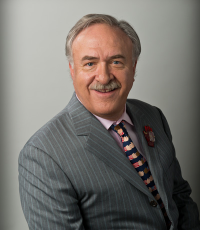Dr. A. Lee Osterman is our PA Surgeon In the Spotlight!
 "True happiness is found in serving others." "True happiness is found in serving others."
- Albert Schweitzer
Dr. Osterman, a practicing orthopaedic surgeon at Philadelphia Hand to Shoulder Centers, is also a full professor of Hand and Orthopedic Surgery at Thomas Jefferson University. He has received numerous awards and honors. Below is just one experience that demonstrates his character as a doctor, and most likely will restore your faith in humanity!
The Past and Present Rwanda
Rwanda is one of the smallest countries in mainland Africa located in the central eastern area of the continent, landlocked and bordered by Tanzania, Uganda, the Congo, and Burundi.
The country has a current population of 12.5 million with a median age of 19. The main ethnic groups art the Tutsi and the Hutu. The country gained notoriety through the horrific genocide in 1994, popularized by the movie Hotel Rwanda, when an estimated 800,000 people — mostly Tutsi men, women and children — were killed in 100 days. The country has been peaceful and stable for over 20 years thanks in part to its President Paul Kagame who has emphasized reconciliation rather than retribution and has ushered in an era of economic growth with a knowledge-based economy.
It is also a beautiful country, nicknamed the "land of a thousand hills", and one of the last habitats of the critically endangered mountain gorillas that made Dian Fossey and the movie Gorillas in the Mist a symbol for wildlife protection.
A Courageous Request
The initial request for help came from Dr. Charles Furaha, chief surgeon at the University Teaching Hospital of Kigali and the only plastic and hand surgeon in Kigali. Dr. Furaha wrote:
“It is real that in Rwanda we need brachial plexus surgery big time, and nobody is providing it. There is a large industry of taxi moto that most young people and sometime not so young use for their daily commute. Most of the drivers of taxi motos ride them very recklessly and are involved in most of the traffic accidents. This causes many injuries including brachial plexus injuries and they go untreated. With my training in plastic surgery and microsurgery, I believe, given the right exposure, I will be able the deal with those injuries and help those patients. It will be terrific if you can get the time to provide me with an opportunity to train in this field through your personal coaching.”
Basic health care is provided by 440 community health centers and 48 district hospitals. There are four national hospitals, three in Kigali (the capital city) and one in Butaire. There are four CAT scanners and five MRI’s in the entire country. There are six orthopedic surgeons and one plastic surgeon who functions as the nation’s only hand surgeon despite limited training. When we were there, they graduated their first class of eight orthopedic residents.
It is also the land of 100,000 motorcycles, which are the main mode of motorized transportation. Unfortunately, accidents are frequent as are injuries to the brachial plexus. Obstetrical brachial plexus palsies such as Erb’s are also common. The goal of our mission was to introduce and educate the orthopedic and plastic surgeons in the sophisticated diagnosis and treatment of these injuries.
A Mission to Educate
After a 20-hour flight covering some 7,200 miles we arrived in Kigali. The mission participants included Dr. A Lee Osterman, Dr. Adam Strohl, and Dr. Dan Zlotolow, as well as three nurses skilled in nerve surgery, two hand fellows, and two hand therapists. We spent our first day screening over 90 nerve injured adult and pediatric patients. Day two was spent preparing the operating schedule as well as providing didactic lectures for attendings, residents, and medical students from orthopedics, neurosurgery, and plastic surgery. The next four days, we performed over 17 brachial plexus and nerve cases each averaging six hours with operative days that averaged 14 hours. Surgeries included multilevel intercostal nerve procedures, Oberlin nerve transfers for biceps function restoration, tendon transfers in Brachial Plexus Birth Injuries, and shoulder fusions. By the fourth day, Dr. Furaha and his team were able to independently perform several brachial plexus cases with us as observers. He was now ready to become a teacher of what we had taught him. A critical goal of our mission had been accomplished! Other remarkable cases included tumor resections and burn contracture releases of the upper and lower extremities.
One Trip Many Lives Changed
The trip culminated in a dinner at the Hotel des Mille Collines, portrayed as Hotel Rwanda in the namesake movie, with our new colleagues and plans for repeat missions to amplify the skills which had been taught and evaluate the outcomes of the patients that were treated. In addition, the team visited the Kigali Genocide Memorial where they learned about Rwanda’s dark history of political and tribal strife as well as its later recovery and growth. Subsequently, the Hand Rehabilitation Foundation has sponsored a Rwandan therapist to our March Philadelphia meeting for advanced training.
In summary, it was an experience that affected all involved forever.
|